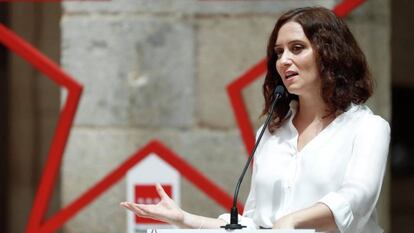Madrid to make face masks mandatory in all public spaces
The regional leader also wants to introduce an experimental 'Covid-19 passport' to prove immunity

The premier of Madrid, Isabel Díaz Ayuso, announced on Tuesday that face masks will be mandatory in all public spaces, including sidewalks cafes, even when social distancing measures can be respected. The new rule, which has already been introduced in all of Spain’s 17 regions with the exception of the Canary Islands, will come into effect on Thursday. Violators will face fines of up to €100.
The initiative comes after the Madrid region reported a sharp rise in weekly coronavirus cases. This figure jumped from 269 on Monday, July 20, to 1,381 on Tuesday – an increase of 413%.
The new measure is part of an “action plan” aimed at curbing coronavirus contagion in the region. Under this plan, social gatherings will be limited to 10 people and nighttime venues will have to close at 1.30am – but no more customers will be allowed inside the premises after 1am. These establishments will also need to register their clients’ ID to make contact tracing easier in the case of a Covid-19 outbreak. The plan also reduces the capacity of sidewalk cafes and restaurants, but the regional government did not specify by how much.
We are worried about the behavior of many young people. They are endangering their neighbors but also their academic and working futureMadrid premier Isabel Díaz Ayuso
Regional authorities in Catalonia, Valencia and Murcia have also introduced restrictions on nighttime activities, which have been linked to the recent surge in coronavirus cases.
Speaking at a press conference on Tuesday, Díaz Ayuso called on young people to show greater responsibility. “We are worried about the behavior of many young people. They are endangering their neighbors but also their academic and working future. The young people of Madrid have to become our allies,” she said.
The Popular Party (PP) politician explained that the new strategy is aimed at avoiding a return of confinement measures, which have been reintroduced in areas of Catalonia and Aragón. “The strategy now is to not go back,” she said.
On Sunday, the region reported two new Covid-10 outbreaks, bringing the total to 11, with 70 confirmed cases. A total of 128 coronavirus patients are in hospital, with 27 in the intensive care unit. According to the regional government, the outbreaks are linked to social and work settings, but did not provide more information.
Immunity passport
Díaz Ayuso also announced plans to trial a “Covid-19 passport” in September to identify those individuals who have developed antibodies to the disease. According to the premier, this card would be available to those who have recovered from the coronavirus and have taken a PCR test.
“With this card, it will be much easier to access gyms, museums and closed spaces,” she said, arguing the “experimental project” will make it “much easier to avoid confinement measures. Everyone who cannot get infected will be able to continue to have a normal life.”
The World Health Organization (WHO), however, recommended against an immunity passport back in April, arguing there was not enough scientific evidence for its use. “There is currently no evidence that people who have recovered from Covid-19 and have antibodies are protected from a second infection,” the organization wrote on April 25.
Following intense criticism of the measure, deputy premier Ignacio Aguado clarified that the idea was rather to create a “registry” that health professionals could use in order to see what tests had been done on patients.
Contact tracing
After reporting unclear figures for several weeks, regional health chief Enrique Escudero on Tuesday announced that 180 new contact tracers will be hired, bringing the total to 360 by the end of the week. The Madrid region has a population of nearly seven million, meaning there will be one tracker for every 20,000 citizens, compared to one for every 4,000 in Germany.
Most of Madrid’s public health and primary care associations signed a document two days ago expressing strong criticism of the regional government’s handling of the crisis. “Waiting until the is a significant new surge before hiring more personnel is not a valid option, because it means acting when community transmission is already relevant, which prevents outbreaks from being contained without other, tougher measures,” said the document, which recommended hiring between 800 and 1,200 contact tracers.
Obtaining figures on the epidemiological situation in Madrid is difficult. The regional government does not publish the positivity rate for Covid-19, meaning how many tests have come back positive for Covid-19 out of the total number of tests. Nor does it break down where the 100 daily coronavirus cases are coming from. If there are only 11 outbreaks in Madrid, why are there so many new infections?
English version by Melissa Kitson.
Tu suscripción se está usando en otro dispositivo
¿Quieres añadir otro usuario a tu suscripción?
Si continúas leyendo en este dispositivo, no se podrá leer en el otro.
FlechaTu suscripción se está usando en otro dispositivo y solo puedes acceder a EL PAÍS desde un dispositivo a la vez.
Si quieres compartir tu cuenta, cambia tu suscripción a la modalidad Premium, así podrás añadir otro usuario. Cada uno accederá con su propia cuenta de email, lo que os permitirá personalizar vuestra experiencia en EL PAÍS.
¿Tienes una suscripción de empresa? Accede aquí para contratar más cuentas.
En el caso de no saber quién está usando tu cuenta, te recomendamos cambiar tu contraseña aquí.
Si decides continuar compartiendo tu cuenta, este mensaje se mostrará en tu dispositivo y en el de la otra persona que está usando tu cuenta de forma indefinida, afectando a tu experiencia de lectura. Puedes consultar aquí los términos y condiciones de la suscripción digital.









































